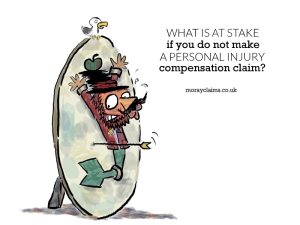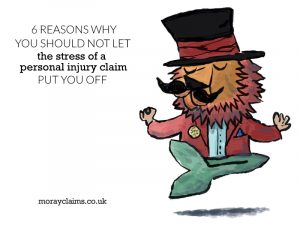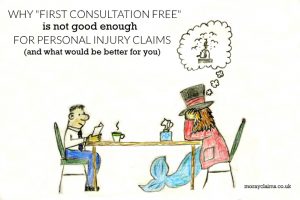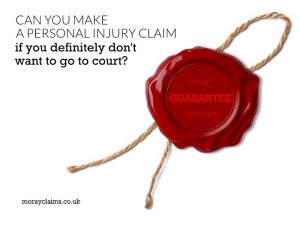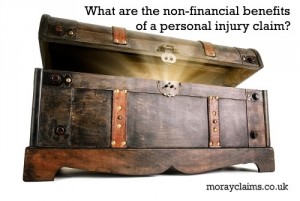What do you stand to lose if you do not make a claim for personal injury compensation in a situation where that would be a realistic option for you? In this article, we will consider 3 ways you can lose out if you don't make a personal injury claim. The general principles here may be obvious but probably not all of the details will be known to you already. Knowing these things is an important part of your "informed consent" - i.e. having all the relevant points to hand before making your decision: to claim or not to claim. Firstly, we will look at your “loss” due to your failure to give yourself the benefit of monetary compensation. In fact, that loss does not just apply to you; it can apply to others who would have to rely on you making a claim in order for them to be compensated as well. Secondly, we will discuss the fact that you only have the choice to make a personal injury compensation claim for a limited period of time. The right does not last forever. Once the right Continue Reading
6 reasons why you should not let the stress of making a personal injury claim put you off
We get stressed about money, reputation, safety, relationships, life changes… Life changes are a journey. And they’re journeys that usually involve stress. By the end, you're a different person. Both elements – change and stress – play their part in the transformation process. Personal injury claims are stressful. In this article, we’ll look at the nature and causes of the various stresses. Then, having considered these ‘problems’, we’ll list out the ‘solutions’ - the reasons why, nevertheless, you should go ahead with a personal injury compensation claim. Getting injured creates its own acute stress at the time. Often, there’s immediate severe pain. Beyond that, you have a loss of independence – with increased dependence on others. And also fears for the future: will you recover to full fitness? Most people seek legal representation for a personal injury compensation claim after the acute phase of the injury is over. Perhaps after you get out of hospital or after you Continue Reading
Why First Consultation Free is not good enough for personal injury claims (and what is better for you)
Is one font better for your memory than another? Can the design of the typeface used to put information into a readable form make a difference to how well you will recall that information later? Research on this issue at RMIT University in Melbourne concluded that most of the fonts we see every day are similar. Their familiarity means we often glance over the words they form and no memory trace is created. On the other hand, at the other end of the spectrum, if typography is too different from the norm, the brain does not process it well and, again, we don’t retain the information. Is there a way to overcome this balancing act between over-familiarity and unreadableness? RMIT has developed the font, Sans Forgetica, which could be the answer. They say it lies at a sweet spot where, although the appearance of the font forms something of a barrier to the learning process, overall it helps the learning process rather than hindering it. They have proved this via a mixed lab Continue Reading
Can you make a personal injury claim if you definitely don’t want to go to court?
Tilley hats might be the best in the world. They’ve been called “legendary” and “iconic”. Tilley hats float and, if lost or stolen, can be replaced for half their full purchase price. Should the hat wear out due to normal wear and tear, poor workmanship or faulty material, it will be repaired or replaced free of charge. Tilley hats are guaranteed for life. In 2013, a Guardian reader reported that, when the fabric of their hat split after 17 years, Tilley still honoured the lifetime guarantee and replaced it. They’re expensive hats but the various risk-reversal elements clearly help keep them desirable purchases. A guarantee can make a big difference to how likely we are to choose a product or service. In the context of personal injury compensation claims, not everyone wants to have their day in court. On the other hand, in another article on this website, we’ve considered the pros and cons for those who want a guarantee that their personal injury claim’s outcome will be Continue Reading
3 Non-Financial Benefits of a Personal Injury Claim
What are the non-financial benefits of a personal injury claim? Personal injury claims are about compensation for loss. The law measures that loss in money terms, even though some losses cannot easily be valued financially. It’s straightforward to work out the wages you’ve lost from being off work as a result of your accident. Well, it is compared to valuing your injuries. And how can you put a fair value on a broken arm, let alone the death of a relative, anyway? In making a personal injury claim, money may not be the most important factor for you. For some people, it’s of no importance at all. The law looks at personal injury claims in terms of money but there are non-financial benefits associated with personal injury claims and it is worth considering them. They might be what persuade you to proceed with a claim where, otherwise, you might decide not to bother. Better understanding of your injuries, present state of recovery and prognosis In cases of serious injury, Continue Reading
When a court action may not be necessary in order to win your claim …
It can often be a frustrating game for consumers with possible claims against large organisations or corporations. If liability is denied by the company (or if they don’t even engage in negotiations) you generally face the prospect of having to raise a court action to press your claim. Expenses or costs tend to follow success in court actions so, even where you have what seems to be a strong claim, the economic imbalance between the parties can make the prospect of a court action quite daunting for you as the consumer: if you lose, you may have a large bill to pay. Canadian Musician, Dave Carroll, found a perfect way round this problem when United Airlines allegedly caused significant damage to his expensive guitar at Chicago Airport. He wrote and recorded a song and uploaded the video to YouTube. This reportedly knocked around $180 million off the share value of the company in the aftermath of its release. We don’t suggest you try this if you want to complain about Continue Reading
